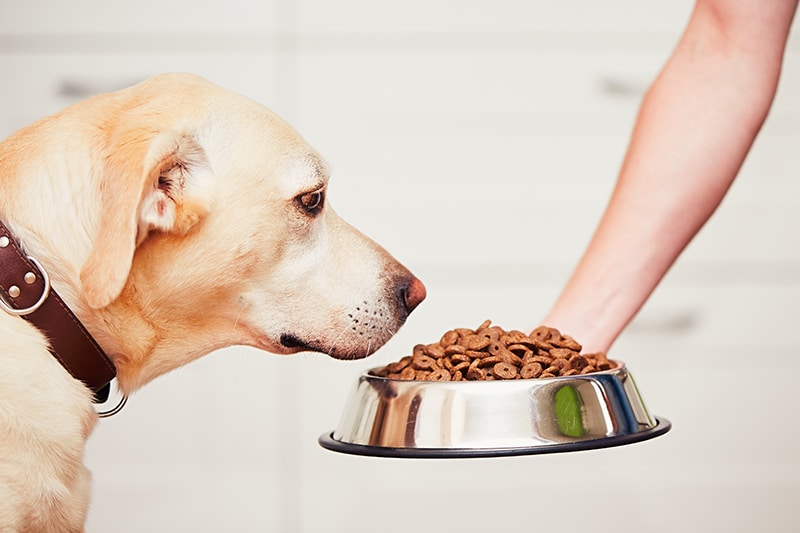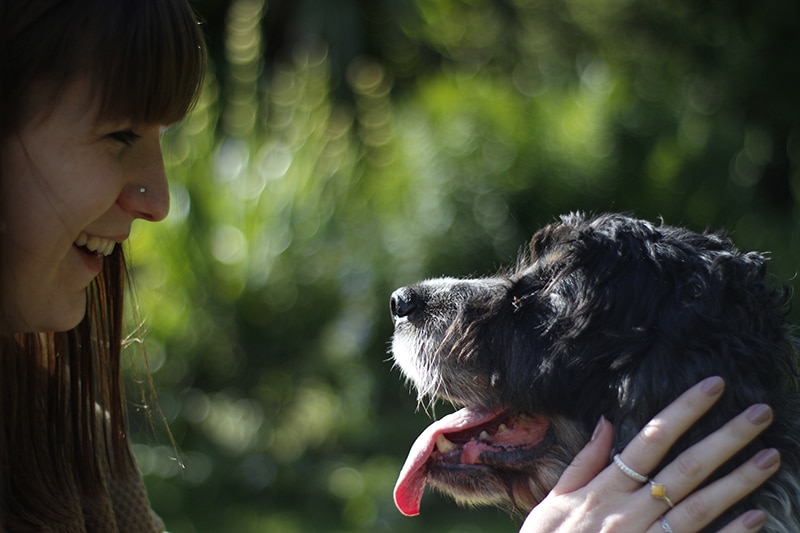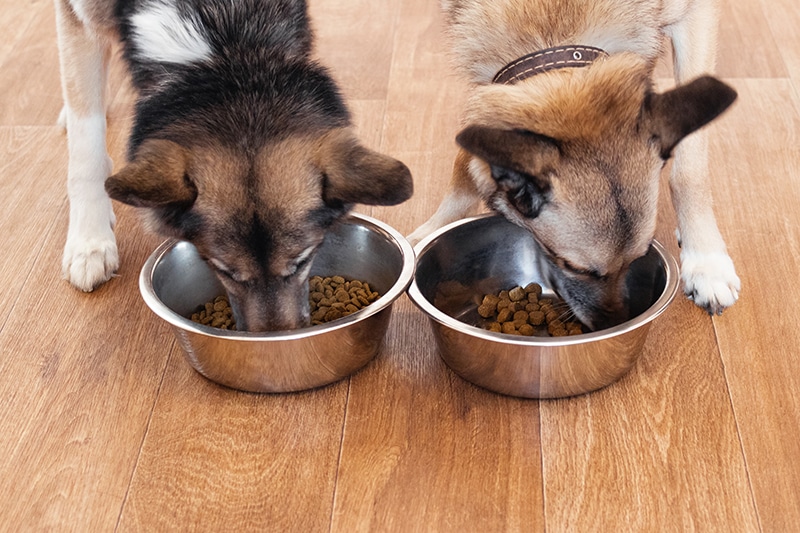Allergies, a word that strikes fear into many dog parents; it’s incredibly stressful watching your best friend scratching their skin raw until it bleeds or having a tummy upset if they so much as sniffing a treat.
That’s why we’ve put together this comprehensive review on the best dog food for allergies to help you find the most suitable product for your pooch. But, of course, not every product will work for every doggie, so you may need to perform “food trials” with your dog to find what works best for your pup.
I used my 8 years of Veterinary experience as companion animals vet to review over 30 dog food products to find the best dog food for allergies in general.
After evaluating over 30 dog food for allergies products, I found that “Hill’s Science Diet sensitive stomach and skin” has the best overall combination of allergens-free, nutrients and quality sources.
An allergy occurs when an animal’s immune system overreacts to a specific compound or substance (allergen). These can be a wide range of things, though most are proteins.
As a veterinarian, approximately 30% of my patients suffer from an allergy of some type. Many are food-related though some are allergic to pollen or insects. It can be pretty distressing to see a dog come to the clinic with hair loss, raw skin, and their owner in tears worrying for their best friend.
As always, this review isn’t a substitute for veterinary advice, and if you suspect that your pup has allergies, you should always consult your veterinarian in the first instance.
Let’s dive in and find out more…
Why Do Allergies Happen?

An allergy is the result of repeated exposure to an allergen. This continued stimulation “Sensitizes” the immune system to a point where it overreacts. A normal immune response should protect your pup from infection and illness. For pets with allergies, however, the immune response can cause damage to their body.
Dogs can develop an allergy to any substance to which they are repeatedly exposed. Allergies are caused by the body’s immune system overreacting to a substance. Your dog’s body then produces antibodies that recognize the allergen as dangerous. Inflammation then develops within the body, which causes signs on the skin, airways, or digestive system.
Proteins are the most common source of allergic reactions. These can be animal, insect, or plant-based proteins. Some examples include spores, pollens, mites, and flea saliva.
The main substance that causes allergic reactions is glycoproteins. These are found in meats such as beef or poultry, cereals, and potatoes. Some additives in food products are suspected of playing a role but haven’t been proven to date. In addition, some chemical compounds can also elicit an allergic reaction in pets. These include some medications.
The main clinical sign of food allergies tends to be severe itching that isn’t related to any particular season. Inflammation and infections of the ears are also common. I addition, some dogs display signs of gastrointestinal distress, including anal gland inflammation, chronic diarrhea, or vomiting.
Dietary Needs Of Dogs With Allergies & Elimination Diet

Most common food allergens for our canine companions are proteins that our dogs are most commonly exposed to in their diet including chicken, beef and sometimes even lamb.
The main goal is to prevent having the allergen in your dog’s diet. Often your vet will advise an elimination trial diet to help diagnose a specific allergy or food sensitivity and some dog’s find that their new diet is perfect for their needs without needing to change again.
If your dog is truly sensitive to one of the common proteins then a ‘novel protein source’. This may include egg, venison, duck, white fish or even more exotic wild game such as ostrich or kangaroo. Many commercial dog food companies offer these as part of their ‘everyday’ diets for dogs which isn’t necessarily good.
As a veterinarian, I advise my clients to avoid feeding these diets to their pup’s unless required as your dog may develop an allergy to one of these instead. These novel proteins are often mixed with the common protein allergens in these diets which can make it even more difficult to find a suitable new diet for your dog if they have a food sensitivity.
The Veterinary Elimination Diet Trial
The most effective way to diagnose a food allergy is an elimination diet. When performing an elimination diet, your dog’s diet should consist of protein, carbohydrates, and fats that your dog has never had before. The focus should be on a single protein source at a time, with this diet being fed to your dog of at least 4-6 weeks, though this may need to be extended beyond 10 weeks.
Once signs have been completely resolved, then “challenge” tests can be started. A single ingredient should be added to your dog’s diet. If your dog has an allergy, then clinical signs will likely be seen within 2-48 hours, though some reactions can be delayed up to 2 weeks (4)
Food Options for Dogs With Allergies

There are so many foods on store shelves these days lauding the benefits of “gluten-free” or “limited ingredients.” Do they matter, though? For most dogs, a good quality commercial kibble tailored to their life stage is suitable. If your pooch has an allergy, however, then some specialty diets may be helpful.
- Prescription dog food – These diets are available through your veterinary surgeon, on prescription only. A prescription diet will be tailored toward your dog’s specific nutritional requirements. There are diets designed for dogs with illnesses including diabetes, kidney disease, and allergies. Hydrolyzed proteins are commonly used in elimination diets for dogs with allergies.
- Limited ingredient dog food – Limited ingredient kibbles are a wonderful option if you know exactly what ingredients adversely affect your pooch.
- Novel Proteins dog food – These are proteins that your dog hasn’t been exposed to before. Novel protein diets tend to include sources such as kangaroo, ostrich, elk, venison, or duck as the protein. If your dog doesn’t have a food allergy, then feeding a novel protein source won’t prevent them from developing one.
- Grain-free dog food – Grain-free foods have been “trendy” in the last number of years but feeding these diets is unnecessary for the vast majority of dogs. Some grains such as rice contain glycoproteins; these are relatively common allergens for pooches with food sensitivities.
Our 2024 Review For 14 Best Dog Food For Allergies

We reviewed over 30 products by following the process presented above and classified the best dog foods for allergies.
We considered the life stage, essential nutrients and ensured their quality and safety from dogs with allergies.
It’s important to remember that there’s no single best food for all dogs with allergies and your veterinarian is best placed to advise you about your pooch and their specific needs. The foods below address the most common allergens that might not apply to your dog.
Hill’s Science Diet Sensitive Stomach and Skin Dog Food
- First 5 ingredients: Chicken, Brewers rice, Chicken meal, Yellow peas, Cracked pearled barley.
- Key features:
- Contains beet pulp as a prebiotic.
- Contains chicken which is one of the commonly seen allergens in dog foods.
- Added vitamin E and omega fatty acids help to support a lustrous haircoat.
- Guaranteed Analysis: 21% crude protein, 12% crude fat, 4% crude fiber, 3% omega fatty acids.
- Caloric content: 382kcal/cup ME
- Type of product: Sensitive stomach.
- Life stage: Adult.
- Best for: Overall Pick, Suitable for adults with sensitive tummies.
- AAFCO statement: Formulated to meet AAFCO maintenance guidelines.
Nulo Small Breed Freestyle Limited
- First 5 ingredients: Deboned turkey, turkey meal, chickpeas, sweet potatoes, canola oil.
- Key features:
- The single protein source is turkey, low fat and high in B vitamins.
- It contains specially-formulated Ganeden BC30 probiotics to support a healthy gut.
- Guaranteed Analysis: 30% crude protein, 17% crude fat, 3.5% crude fiber, 5.33% omega fatty acids.
- Caloric content: 427kcal/cup ME
- Type of product: Limited ingredient diet. Grain-free.
- Life stage: Puppy.
- Best for: Puppies with sensitive tummies.
- AAFCO statement: Formulated to meet AAFCO maintenance guidelines.
American Journey LID Hypoallergenic Dog Food
- First 5 ingredients: Deboned salmon, salmon meal, peas, pea starch, sweet potatoes.
- Key features:
- Single animal protein source with salmon as a novel protein source.
- Peas and sweet potatoes provide an easily digestible source of carbohydrates
- Flaxseed and sunflower oil supports healthy skin and hair coat.
- Guaranteed Analysis: 25% crude protein, 12% crude fat, 6% crude fiber, 3.1% omega fatty acids.
- Caloric content: 345kcal/cup ME
- Type of product: Grain-free limited ingredient diet.
- Life stage: All life stages.
- Best for: Seniors that have sensitive tummies and itchy skin.
- AAFCO statement: Formulated to meet AAFCO maintenance guidelines.
Purina Pro Plan Focus Sensitive Skin and Stomach
- First 5 ingredients: Salmon, barley, rice, oatmeal, canola meal.
- Key features:
- Salmon provides a great novel protein source for dogs with sensitive stomachs.
- Chicory root, probiotics, and rice all support healthy digestion.
- Contains beef fat and B vitamins.
- Suitable for pooches with sensitive skin and digestive systems and those needing to lose a few extra pounds.
- Guaranteed Analysis: 26% crude protein, 16% crude fat, 4% crude fiber, 2.35% omega fatty acids.
- Caloric content: 467kcal/cup ME
- Type of product: Sensitive digestion.
- Life stage: Adult.
- Best for: Budget
- AAFCO statement: Formulated to meet AAFCO maintenance guidelines.
Lucy Pet Formula Limited Ingredient Food – Duck & Potato
- First 5 ingredients: Duck, dried potatoes, duck meal, dried sweet potatoes, duck fat.
- Key features:
- Duck is a single animal protein source in this food.
- Flaxseed, chicory root, kelp and pumpkin all support digestion and a healthy immune system.
- Guaranteed Analysis: 22% crude protein, 14% crude fat, 7% crude fiber, 2.3% omega fatty acids.
- Caloric content: 395kcal/cup ME
- Type of product: Grain-free, limited ingredient diet.
- Life stage: Adult.
- Best for: Chicken Allergy, Dogs with allergies requiring novel carbohydrate and protein sources.
- AAFCO statement: Formulated to meet AAFCO maintenance guidelines.
Nutro Limited Ingredient Diet Dog Food Duck flavor
- First 5 ingredients: Deboned duck, Duck meal, Peas, Sweet Potatoes, Pea starch.
- Key features:
- Single source protein and duck is uncommon in most commercial foods.
- No poultry by-product meals or artificial preservatives, flavors or colors to minimize exposure of your pooch to some irritant molecules.
- It is also available in wet food and dog treats to allow some variety for fussy pups while sticking to their diet.
- Guaranteed Analysis: 25% crude protein, 12% crude fat, 6% crude fiber and 2.65% omega fatty acids.
- Caloric content: 350kcal/cup ME
- Type of product: Grain-free and limited ingredient diet. Single source of protein.
- Life stage: Adult.
- Best for: Egg Allergy, Suitable for elimination-challenge diets
- AAFCO statement: Formulated to meet AAFCO maintenance guidelines.
Just 6 by Rachel Ray Nutrish Hypoallergenic Food
- First 5 ingredients: Lamb meal, brown rice, ground rice, dried plain beet pulp, chicken fat.
- Key features:
- Made with just six natural ingredients.
- Lamb provides a novel protein source for sensitive dogs.
- Also contains chicken fat and pork flavoring which may not be suitable for some dogs.
- Guaranteed Analysis: 20% crude protein, 13% crude fat, 4% crude fiber, 1.5% omega fatty acids.
- Caloric content: 321 kcal/cup ME
- Type of product: Grain-free and limited ingredient diet.
- Life stage: Adult
- Best for: Beef Allergy, Dogs needing a limited ingredient diet with extra vitamins and minerals.
- AAFCO statement: Formulated to meet AAFCO maintenance guidelines.
Brothers Complete Allergy Care Dog Food – Goat & Egg
- First 5 ingredients: Goat meal, whole eggs dried, turkey meal, cassava/tapioca, peas.
- Key features:
- Multiple protein sources from goat, turkey and eggs. All of these aren’t common protein sources in most dog foods.
- Eggs contain all 23 amino acids.
- It contains both pro and prebiotics, alfalfa, and enzymes to support digestion.
- Guaranteed Analysis: 30% crude protein, 15% crude fat, 4% crude fiber, 3.18% omega fatty acids.
- Caloric content: 400kcal/cup ME
- Type of product: Grain-free, Weight control
- Life stage: Suitable for pooches of all ages
- Best for: Gluten-Free, Dogs with allergies that are also prone to gaining weight.
- AAFCO statement: Formulated to meet AAFCO maintenance guidelines.
Holistic Select Adult Health Grain-Free Rabbit & Lamb Meal Dry Dog Food
- First 5 ingredients: Rabbit meal, lamb meal, chickpeas, lentils, peas.
- Key features:
- Rabbit and lamb provide two novel animal protein sources for dogs that have allergies to commonly used proteins.
- It is fortified with antioxidants, glucosamine, probiotics, and taurine to support joint, heart, and digestive health.
- Guaranteed Analysis: 31% crude protein, 13% crude fat, 6% crude fiber, 4.5% omega fatty acids.
- Caloric content: 351kcal/cup ME
- Type of product: Grain-free
- Life stage: Adult
- Best for: Best for Adults with allergies that need novel proteins.
- AAFCO statement: Formulated to meet AAFCO maintenance guidelines.
Royal Canin Veterinary Diet Hydrolyzed Protein Adult HP Dry Dog Food
- First 5 ingredients: Brewers Rice, Hydrolyzed Soy Protein, Chicken Fat, Natural Flavors, Dried Plain Beet Pulp
- Key features:
- Hydrolyzed proteins have the least chance of triggering a reaction in dogs with sensitivities.
- Fatty acids, vitamins, and prebiotics support a healthy gut and skin.
- Guaranteed Analysis: 19.5% crude protein, 17.5% crude fat, 3.1% crude fiber, 0.7% omega fatty acids.
- Caloric Content: 332kcal/cup ME
- Type of product: Prescription dog food. Hydrolyzed protein.
- Life stage: Adult
- Best for: Allergies (General) Life-long management of patients suffering from allergies
- AAFCO statement: Formulated to meet AAFCO maintenance guidelines.
Earthborn Holistic Venture Turkey and Squash Formula
- First 5 ingredients: Turkey, turkey meal, butternut squash, tapioca, pumpkin.
- Key features:
- Extra taurine and methionine support your dog’s heart health.
- Lean turkey protein is an excellent source of vitamins and minerals.
- Butternut squash, tapioca, and pumpkin all support healthy digestion.
- Guaranteed Analysis: 25% crude protein, 13% crude fat, 6.5% crude fiber, 5.2% omega fatty acids.
- Caloric content: 335kcal/cup ME
- Type of product: Grain-free, limited ingredient diet.
- Life stage: Adult.
- Best for: Sensitive Stomach, Dogs that need a novel protein source and have grain sensitivities. Great for eco-conscious owners, too as the packaging is 40% plant-based.
- AAFCO statement: Formulated to meet AAFCO maintenance guidelines.
Hill’s Prescription Diet d/d Skin/Food Sensitivities Potato & Venison Formula Dry Dog Food
- First 5 ingredients: Potatoes, potato starch, venison, potato protein, soybean oil.
- Key features:
- Single animal protein source with novel protein, venison.
- Prescription-only diet.
- Guaranteed Analysis: 14% crude protein, 13% crude fat, 3% crude fiber, 3% omega fatty acids.
- Caloric content: 371kcal/cup ME
- Type of product: Prescription diet. Grain-free. Veterinary Formulation
- Life stage: Adult
- Best for: Skin Allergies, Suitable for dogs suffering from allergies and experiencing skin signs.
- AAFCO statement: Formulated to meet AAFCO maintenance guidelines.
Wellness Simple Limited Ingredient Diet Turkey and Potato
- First 5 ingredients: Deboned turkey, turkey meal, potatoes, peas, dried ground potatoes.
- Key features:
- Grain-free with a single source of protein and easily digestible carbohydrates. Beneficial for dogs with grain sensitivities or trying an elimination diet.
- It is fortified with fatty acids, antioxidants, and probiotics for extra immune support.
- Dogs with sensitive tummies
- Guaranteed Analysis: 26% crude protein, 12% crude fat, 5.5% crude fiber, minimum 3.8% omega fatty acids.
- Caloric content: 430kcal/cup ME (metabolizable energy)
- Type of product: Limited ingredient diet, Grain-free. Single source of protein.
- Life stage: Adult
- Best for: Grain-Free
- AAFCO statement: Formulated to meet AAFCO maintenance guidelines.
Zignature Turkey Formula Limited Ingredient Dog Food – canned
- First 5 ingredients: Turkey, turkey broth, turkey liver, peas, turkey meal.
- Key features:
- Single protein source, turkey is low in saturated fat.
- Grain-free with a small number of ingredients to minimize your dog’s exposure to possible allergens.
- Guaranteed Analysis: 11.5% crude protein, 5% crude fat, 1.2% crude fiber.
- Caloric content: 397kcal/can ME
- Type of product: Grain-free, limited ingredient diet.
- Life stage: Adult and puppy.
- Best for: Wet Food, Suitable for both puppies and adults that need to avoid the most common food allergens, including corn, wheat, dairy, and chicken.
- AAFCO statement: Formulated to meet AAFCO maintenance guidelines.
Frequently Asked Questions

Limited Ingredient Or Hypoallergenic dog food what’s the difference?
Hypoallergenic foods are generally limited ingredient diets as they’re designed to minimize the risk of exposure to food allergens. Limited ingredient diets should generally contain just one source of grain or protein. Not all limited ingredient foods are hypoallergenic, nor are they all suitable for all dogs with food allergies.
Between Food Allergies vs. Simple Food Intolerance: what’s the difference?
Food allergies involve your pooch’s immune system being triggered by an allergen. Conversely, food intolerances are abnormal responses to an ingredient that doesn’t involve the immune system. Allergies are damaging to your dogs body and often involve organs outside the digestive system, including skin and ears. Food intolerances tend to be limited to digestive upsets.
Is Raw Food the Answer to Dog Food Allergies?
No. Raw food diets are touted by so many sites and companies as a “cure-all” for your dog’s needs but the science doesn’t back up these claims. If your pup is allergic to beef kibble, then feeding raw beef won’t make their symptoms go away. The diet may work for some dogs, but if your dog is allergic to a range of proteins, then they may need to be fed a special hydrolyzed diet.
How Is Dog Food For Allergies Different From Regular Dog Food?
Dog foods for dogs with allergies are formulated to reduce the risk of your pooch being exposed to an allergen and therefore to have a reaction. These tend to be limited ingredient diets.
Does grain-free dog food help with allergies?
Grain-free diets may help some dogs with allergies to wheat or cereal proteins. Luckily these allergies are rare in dogs. In fact, gluten allergies have only been documented in a family of Irish Setters dogs.
How quickly do food allergies show up in dogs?
Allergies tend only to be seen in dogs over two years old as it takes time for the immune system to become sensitized to an allergen. Though uncommon, there have been reported food allergies in some puppies.
What meat are dogs least allergic to?
Chicken and beef are the most commonly reported allergens in our canine companions, but these are also some of the most common ingredients in dog food. A dog can be allergic to any protein that they’re exposed to, including kangaroo or ostrich etc. We tend not to see so many of these allergies because they’re not common ingredients in dog foods.
What is the safest protein for dogs with allergies?
There’s no single protein that is safe to give every dog with allergies.
Does high-protein diet trigger allergies?
No, dogs are carnivores, so they’ve evolved to eat and digest a high protein diet.
Is rice good for dogs with allergies?
If your dog isn’t allergic to rice glycoproteins, then yes it’s suitable for your dog.
Is chicken good for dogs with allergies?
Chicken is one of the most commonly reported food allergens in our canine companions, so it may not suit many dogs with allergies. If your dog isn’t allergic to chicken, though, then it’s a safe option in that situation.
Can probiotics help my dog with allergies?
Not explicitly. Probiotics don’t prevent allergic reactions, though they may help to reduce the negative effects in some situations.
Does fish oil help dogs with itchy skin?
Omega fatty acids are known to help maintain healthy skin and fish oils are chock full of these helpful molecules. Once you know that your dog isn’t sensitive to fish then it may help them.
Can CBD oil help dogs with skin allergies?
There are no proven cases where CBD has been proven to alleviate skin allergies to date, but further research is needed.
What do vets recommend for dogs with itchy skin?
Your veterinarian will recommend soothing remedies for your dog’s irritated skin, depending on the cause. If your dog has itchy skin due to food allergy then your veterinarian may advise a specialized diet.
Are dog allergy tests worth it?
The “gold standard” for diagnosing a food allergy is an elimination-challenge diet. Your veterinarian may advise some laboratory tests to rule out other causes for your dog’s issues. Skin and blood allergy tests for food allergies are often inconclusive. Many of the tests that are available at home aren’t worth the cost due to the poor reliability of these tests.
The Final Woof

There’s no perfect diet for every dog with allergies. Otherwise, we wouldn’t have such difficulties finding suitable diets for dogs with food allergies.
Feeding novel or exotic protein sources to dog’s that don’t need them doesn’t reduce the risk of food allergies. The allergies will just be to the exotic protein.
Starting your puppy on a special diet may be unnecessary for this reason. Grain allergies are uncommon, but there’s a great range of grain-free diets available these days. Royal Canin and Hills produce great allergen-friendly diets in general.
After evaluating over 30 products on the market and comparing them to our criteria and key considerations for dog food for allergies we feel Hill’s Science Diet sensitive stomach and skin is the best dog food for allergies in general.
References
- American Veterinary Medical Association. 2021. Banfield: Few pets allergic to food; flea, environmental allergies rise.
- Cummings Veterinary Medical Center at Tufts University. 2017. What every pet owner should known about food allergies.
- Dopierala, M. and K. Andraszek. 2019. The most common allergic diseases in dogs. Folia Pomer. Univ. Technol. Stetin., Agric., Aliment., Pisc., Zootech. 348 (49) pp 47-56
- Wills, J. and R. Harvey. 1994. Diagnosis and management of food allergy and intolerance in dogs and cats. Aust. Vet. J. 71 pp 322-326


